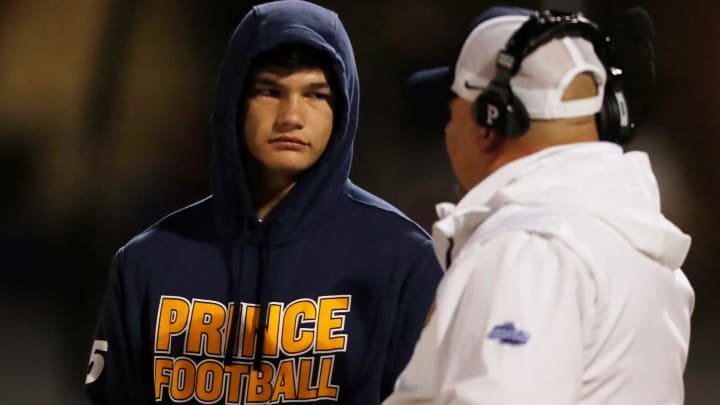Georgia Bans High School NIL Collectives Amidst Athlete Outcry

The Georgia High School Association (GHSA) voted to amend its policies regarding Name, Image, and Likeness payments to prep student-athletes. The changes are focused on curtailing any activity from what is known as NIL Collectives, a system that has permeated and fundamentally altered college athletics. NIL Collectives are shell corporations that function to exploit loopholes in NIL policy and allow donors to pay student-athletes for their athletic talents and enrollment at specific institutions –– these payments are often used in a recruiting context to maintain current players, solicit transfer athletes, or sign top level high school recruits.
With fear of the NIL Collective system seeping down from the NCAA and into the high school level, the GHSA has taken swift action to amend its rules. The new language to GHSA policy was formally voted in yesterday: “No student-athlete may be a member of nor receive compensation or any other benefit from a Collective or NIL Club. A Collective is defined as any group organized or existing for the purpose of compensating or benefiting an individual student[-]athlete or group of student athletes of a member school. NIL Clubs are defined as a group of student athletes organized or existing for the purpose of soliciting funds or other benefits from fans, members or other sources, managing or promoting NIL activities of student athletes or otherwise providing funds or other benefits to an individual student athlete or group of student athletes.”
This change did not come without protest from current high school athletes within the state. An anonymous letter from a student-athlete was sent to both the GHSA and media outlets concerning the upcoming vote. Within the letter, the drafter noted the broad implications of such a policy change on many athletes in Georgia. An excerpt from the letter says, “It appears as though the GHSA either does not want student-athletes to earn money at all, or they only want the superstars to benefit and not the other 200,000 student-athletes who make high school sports so special. If that is the case, it might be more honest to ban NIL activities entirely rather than create an environment where only a select few can benefit. The proposed approach is discriminatory and discouraging for the majority of student-athletes who are trying to make a positive impact and learn important life lessons through these activities."
The market for NIL activations with “influencer” value is slim at the high school level. Very few prep athletes have the requisite fame, social media following, or other metrics of influence needed to engage in NIL partnerships with brands; by limiting the potential for collective-based earnings, the GHSA has slashed the majority of high school athletes' earning power. The market for NIL Collective payments has shown to be strong in the state; as proffered by the letter, “More than 50,000 student-athletes are currently benefiting from the NIL Club app, gaining valuable lessons in financial literacy, entrepreneurship, and community engagement. This app is the most common way Georgia student-athletes are making money from NIL. Taking this away is effectively taking NIL away from the 99% of student-athletes who are not superstars.”
The NIL Club is a creation that has recently been criticized in the state of Florida for violating similar restrictions on NIL Collective behavior prohibited by the Florida High School Athletic Association (FHSAA). The website allows for crowdfunding for various high school and collegiate athletic programs. According to the letter, “This proposed amendment appears to be specifically targeting the NIL Club app and its users, which feels incredibly unfair and overly restrictive given this is the only way many of us are making money from NIL. I have learned that I can create value and build an online community, which has been a learning experience unlike anything I have experienced so far in a classroom.”
A lingering question remains: if the NCAA was unable to regulate NIL Collectives, why do state high school athletic associations like the GHSA and FHSAA believe they have the authority to craft such restrictions?
State NIL legislation, except for Texas, only covers institutions of higher education. For forty-nine states, the governance of high school athletics is not implicated by state NIL provisions that safeguard the ability of athletes to earn NIL without fear of retribution from the schools, conferences, or NCAA. However, just because state law does not directly implicate high school athletics, it does not mean federal law also does not.
For the first two years of the “NIL era,” NCAA policy forbade such behavior from NIL collectives, but the NCAA was hesitant to enforce its own regulations because of the fear of federal antitrust law. Now, in the wake of an antitrust lawsuit stemming from NCAA punishment for NIL Collective practices at the University of Tennessee, the Department of Justice, along with many states, sued the NCAA in federal court. The plaintiffs were awarded a preliminary injunction restricting the NCAA from enforcing any NIL Collective payments regulations.
The GHSA and FHSAA have implemented policies that, similar to old NCAA rules, effectively create a price-fixing regime that does not allow athletes to be compensated according to what the free market is willing to pay them. As evidenced by the NIL Club’s vast usage, the high school-level athlete services market is abundant.
Public policy and pro-competitive reasons for NIL Collectives not to saturate high school sports can be articulated. Do they reasonably override the anticompetitive policies of GHSA and FHSAA? That is for a judge to decide.
